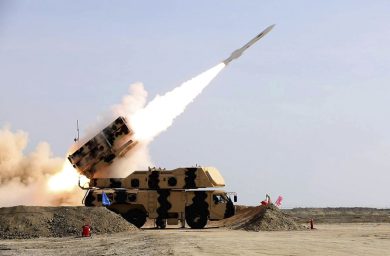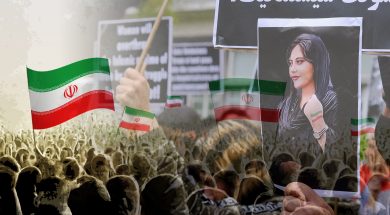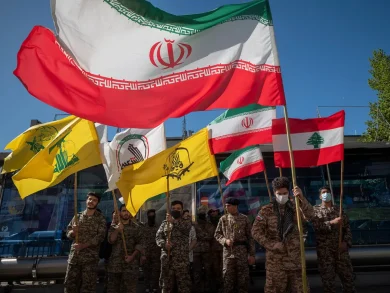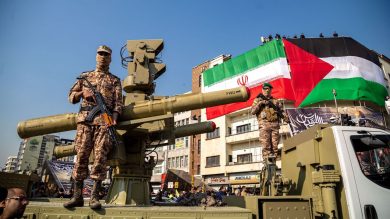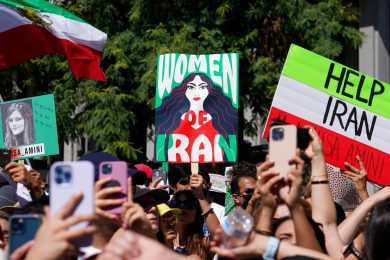The struggle for freedom, human rights, and gender equality in Iran has long extended far beyond the country’s borders. At the heart of this transnational resistance is a powerful and growing force: Iranian women in the diaspora. From the streets of Toronto and Berlin to the halls of the United Nations, diaspora Iranian women have become global voices for justice, demanding accountability for the Islamic Republic’s crimes and lending international strength to domestic movements inside Iran.
As the Islamic Republic and its most repressive arm, the Islamic Revolutionary Guard Corps (IRGC), continue to clamp down on dissent and target women’s rights within the country, Iranian women abroad have emerged as cultural, political, and strategic leaders in the global fight for freedom. These women are activists, journalists, artists, scholars, and human rights defenders—each playing a pivotal role in shaping international discourse and building pressure on the regime.
This analysis explores:
• The role of diaspora women in shaping global awareness
• How their activism bridges internal and external resistance
• The tactics used by the Iranian regime to silence them—even beyond Iran
• The importance of solidarity, digital activism, and coordinated action
1. A Voice Unchained: Why the Diaspora Matters
A. Space to Speak, Freedom to Act
Unlike their sisters in Iran, diaspora Iranian women enjoy freedoms that allow them to speak out without the immediate threat of imprisonment or physical violence. These freedoms come with responsibility—and many have risen to the occasion, acting as amplifiers for those whose voices are silenced inside Iran.
From exiled journalists exposing state crimes to women’s rights defenders organizing international campaigns, diaspora women are:
• Breaking news blackouts during protests
• Advocating for sanctions on human rights violators
• Mobilizing diaspora communities for public demonstrations
• Pressuring governments and international bodies to take action
B. Personal Stakes, Political Impact
Most Iranian women abroad are not disconnected observers. Many have families in Iran, have experienced the regime’s repression firsthand, or have been forced into exile for their beliefs. This deep personal connection adds urgency and authenticity to their activism—and gives them unique credibility with both domestic and global audiences.
2. Leading the Digital Front: Voices That Cross Firewalls
A. Digital Campaigns with Global Reach
Women like Masih Alinejad have turned social media into a battleground. Her campaigns such as #MyStealthyFreedom and #WhiteWednesdays have encouraged thousands of women in Iran to post videos removing their hijabs, defying state mandates in peaceful but powerful protest.
Other digital initiatives include:
• Hashtag campaigns like #WomenLifeFreedom, which went viral globally after the death of Mahsa Amini
• Sharing videos of protests and regime violence that mainstream media in Iran suppresses
• Raising international awareness about political prisoners and rights violations
B. Educating the World
Diaspora women often act as informal ambassadors, educating global audiences about the complex realities of life under the Islamic Republic. They:
• Participate in international panels, university lectures, and media interviews
• Write op-eds and publish research exposing the IRGC’s tactics
• Translate the stories of Iranian women into global human rights narratives
3. Targeted Abroad: The Regime’s Long Reach
The Iranian regime doesn’t stop at its borders. The IRGC and intelligence services have consistently targeted Iranian activists abroad, especially prominent women, through:
• Harassment and death threats
• Cyberattacks and surveillance
• Assassination and kidnapping plots, including attempts on journalists and dissidents in Europe and North America
The case of Masih Alinejad, who faced both a kidnapping attempt and a later armed threat outside her home in New York, shows the regime’s desperation to silence women’s voices—even in exile.
This intimidation strategy seeks to:
• Silence outspoken critics
• Scare others into silence
• Undermine the legitimacy of the diaspora’s work
But despite these threats, Iranian women in the diaspora persist.
4. Building Bridges: From Diaspora to Domestic Movements
A. Strategic Alliances with Inside Movements
While they operate abroad, many diaspora women maintain close connections with activists inside Iran. Through encrypted communications, shared advocacy, and coordinated campaigns, they help:
• Amplify messages from domestic protests
• Fund grassroots movements
• Provide legal, media, and emotional support to those on the ground
B. Countering State Propaganda
The regime often attempts to discredit the diaspora by branding them as:
• “Agents of the West”
• “Traitors to Islam”
• “Tools of imperialism”
But diaspora activists counter this by:
• Centering Iranian voices
• Collaborating with family members of political prisoners
• Highlighting personal stories of persecution and resilience
5. Art, Culture, and Resistance
Diaspora Iranian women have also transformed art and culture into resistance tools:
• Filmmakers tell stories banned in Iran, from women’s prison conditions to forced veiling
• Musicians and poets preserve and revive banned cultural expressions
• Visual artists illustrate the pain and hope of Iranian women’s resistance
Cultural expression plays a crucial role in humanizing the struggle and keeping the movement emotionally resonant in the global imagination.
6. Policy and Diplomacy: Turning Advocacy into Action
A. Lobbying Governments and the UN
Diaspora women are increasingly shaping foreign policy:
• Lobbying for IRGC designation as a terrorist organization
• Pressuring for Magnitsky-style sanctions on rights violators
• Testifying before parliaments and international bodies
Groups led by women have submitted petitions, met with lawmakers, and influenced debates on how countries engage with the Iranian regime.
B. Holding the Global Community Accountable
These activists are also holding the international community accountable for:
• Years of appeasement and silence regarding Iran’s abuses
• Neglecting women’s rights in favor of geopolitical deals
Diaspora women insist that women’s rights and human rights are non-negotiable, and must be central to any diplomatic engagement with Iran.
7. The Path Forward: A Global Women-Led Movement
Iranian women in the diaspora are not just supporting a national struggle—they’re part of a global movement for justice. Their efforts are connected to:
• Global feminism
• Anti-authoritarian movements
• Transnational advocacy for political prisoners and oppressed peoples
Their vision of a free Iran is not limited to regime change—it’s about a transformation of values, toward dignity, inclusion, and justice for all.
Conclusion: Voices Without Borders, Change Without Fear
Iranian women in the diaspora have become strategic leaders, cultural narrators, and political powerhouses in the fight for a free and democratic Iran. Despite surveillance, threats, and exile, they continue to stand firm—amplifying the silenced, educating the world, and organizing for real change.
Join Our Newsletter!
Stay informed with the latest updates, news, and ways to take action in the fight for justice and global security. Sign up now to get updates delivered straight to your inbox!

